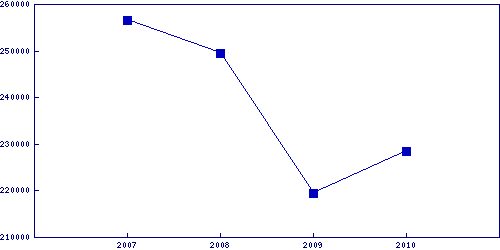If you’ve been watching the news at all in the past year, you know that in most areas, the real estate market isn’t in great shape. To say that it’s a buyer’s market right now is like saying the Pacific Ocean has some water in it.
But what, exactly, is going on, and what does it mean to you & your house? I’m going to demystify this for the average home seller, so you know what you’re up against. Here’s a hint… it’s mostly about the banks.
We all know that getting a mortgage is very difficult these days, and what this means is that the only people who can buy right now are folks that banks consider to be virtually zero risk. On its face, this isn’t a terrible thing, considering how crazy things got a few years ago. But it means a whole lot of buyers have been eliminated. Let’s consider:
1) Real estate investors, or anyone who owns rental property.
At first, you might be thinking, “this doesn’t apply to me — my house isn’t in an area with a lot of rentals.” But realize that if investors can’t buy, that means that a lot of the “deals” out there aren’t being snapped up, and regular buyers are going for them (i.e. foreclosures, short sales, etc). That leaves many conventional sellers on the outs, waiting for the “deals” to go away. With no banks lending to investors, there’s nobody to buy them.
On top of that, regular people who happen to own a rental property or two are out in the cold. Why? Because these days, banks aren’t “counting” rental income towards the bottom line, and so if there’s a mortgage on any of the rental properties, the banks are counting it against the person’s debt/income ratio without counting the income! That makes it difficult (or impossible) for those buyers to get a mortgage, even if they have good credit/income/assets.
2) “Move up” buyers
Buyers who already own a home can no longer get the type of “bridge” financing they used to be able to get, and further, if they decide to lease their current house so they can buy another, see above … the banks won’t count the rental income! That leaves them stuck.
So if you own a house in the “move-up” market (typically $300-500k), this is killing you right now. Potential buyers are hamstrung because they themselves have a house they can’t sell.
So, who’s left? Basically the only person who can get financing these days is a conventional buyer who has no existing mortgage. This means they either own their current home outright, or are renting. By and large, this means first-time home buyers.
First-time home buyers are normally timid, but even doubly so these days. Even though in many areas, this is the best buyer’s market we’ve seen in a long time, first-timers are worried about potentially losing their job, or buying before the market hits bottom. So many are sitting on the sidelines, or out looking, but being extremely picky.
If you’re selling right now, you might have noticed that buyers are nitpicking virtually everything. Here is why. Buyers have so many homes to choose from (partially because there’s no competition from investors right now) so they figure they can wait until they find the Taj Majal for $99k.
If you’ve read this far, you’re probably pretty depressed. It’s indeed very ugly out there right now, and unless you have a flawless property at a great price, it’s challenging to sell in this climate. But don’t despair… things will get better, and possibly sooner than later.
Banks have to start lending eventually. Right now, banks are making all their money on refinances… one after another. Demand is high and risk is low. But eventually rates will rise or demand will slow (or both). And then they are in a pickle. And somewhere, some smart banker will realize that there is massive investor demand and slowly the spigot will open for responsible, creditworthy investors.
When this happens, competition will become fierce for the “deals,” and conventional buyers will have fewer homes to choose from. At that point, more of the “first-time” market will start to turn, and eventually the “move-up” market. And once other banks start seeing their competition making money on responsible investor loans, it’ll snowball.
So in a sense, this is a cautionary tale for buyers … don’t wait too long. And if you’re a seller with a good house at a reasonable price, you will sell.




